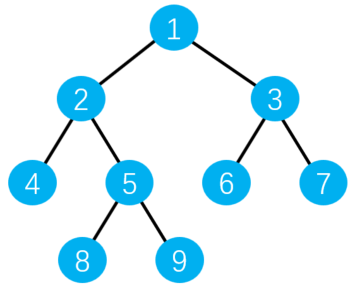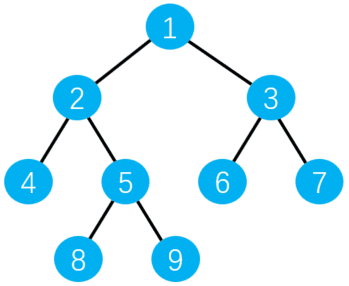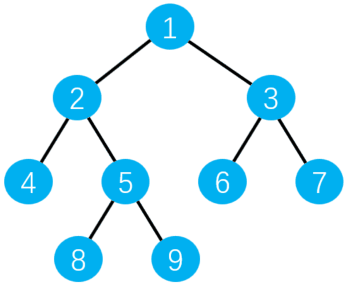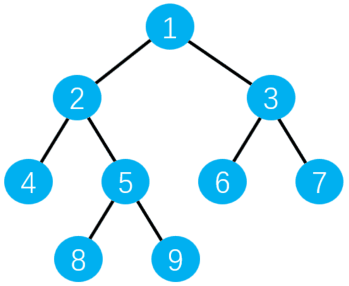二叉树
# 二叉树
二叉树是一种每个节点最多只能有两个子节点的树。
树是一种分层数据的抽象模型。
树的常用操作:
- 深度优先遍历,尽可能深地搜索树的分支。
- 前序遍历,根-左-右
- 中序遍历,左-根-右
- 后序遍历,左-右-根
- 广度优先遍历,先访问离根节点最近的节点。
- 层序遍历
# 树的遍历
比如有这么一棵树

在 JavaScript 中常用Object来实现二叉树,如上图二叉树可表示为:
// 层序结果 [1, 2, 3, 4, 5, 6, 7, null, null, 8, 9]
const bt = {
val: 1,
left: {
val: 2,
left: {
val: 4,
left: null,
right: null,
},
right: {
val: 5,
left: {
val: 8,
left: null,
right: null,
},
right: {
val: 9,
left: null,
right: null,
},
},
},
right: {
val: 3,
left: {
val: 6,
left: null,
right: null,
},
right: {
val: 7,
left: null,
right: null,
},
},
};
# 前序遍历
- 访问根节点
- 对根节点的左子树进行前序遍历
- 对根节点的右子树进行前序遍历

递归版:
/**
* Definition for a binary tree node.
* function TreeNode(val, left, right) {
* this.val = (val===undefined ? 0 : val)
* this.left = (left===undefined ? null : left)
* this.right = (right===undefined ? null : right)
* }
*/
// 递归前序遍历: 根 - 左 - 右
const preorderTraversal = (root) => {
const res = [];
const preOrder = (root) => {
if (!root) return;
res.push(root.val); // 根
preOrder(root.left); // 左
preOrder(root.right); // 右
};
preOrder(root);
return res;
};
非递归版:
/**
* Definition for a binary tree node.
* function TreeNode(val, left, right) {
* this.val = (val===undefined ? 0 : val)
* this.left = (left===undefined ? null : left)
* this.right = (right===undefined ? null : right)
* }
*/
// 前序遍历(非递归)
const preorderTraversal = (root) => {
if (!root) return [];
const res = [];
const stack = [root];
while (stack.length) {
// n是栈顶元素,栈顶元素出栈
const n = stack.pop();
// 访问栈顶元素
res.push(n.val);
// 栈顶左节点入栈
n.right && stack.push(n.right);
// 栈顶右节点入栈
n.left && stack.push(n.left);
}
return res;
};
# 中序遍历
- 对根节点的左子树进行前序遍历
- 访问根节点
- 对根节点的右子树进行前序遍历

递归版:
/**
* Definition for a binary tree node.
* function TreeNode(val, left, right) {
* this.val = (val===undefined ? 0 : val)
* this.left = (left===undefined ? null : left)
* this.right = (right===undefined ? null : right)
* }
*/
// 递归中序遍历:左-根-右
const inorderTraversal = (root) => {
const res = [];
const inOrder = (root) => {
if (!root) return;
inOrder(root.left); // 左
res.push(root.val); // 根
inOrder(root.right); // 右
};
inOrder(root);
return res;
};
非递归版:
/**
* Definition for a binary tree node.
* function TreeNode(val, left, right) {
* this.val = (val===undefined ? 0 : val)
* this.left = (left===undefined ? null : left)
* this.right = (right===undefined ? null : right)
* }
*/
// 中序遍历(非递归)
const inorderTraversal = (root) => {
if (!root) return [];
const res = [];
const stack = [];
let p = root;
while (stack.length || p) {
while (p) {
stack.push(p);
p = p.left;
}
const n = stack.pop();
res.push(n.val);
p = n.right;
}
return res;
};
# 后序遍历
- 对根节点的左子树进行前序遍历
- 对根节点的右子树进行前序遍历
- 访问根节点

递归版:
/**
* Definition for a binary tree node.
* function TreeNode(val, left, right) {
* this.val = (val===undefined ? 0 : val)
* this.left = (left===undefined ? null : left)
* this.right = (right===undefined ? null : right)
* }
*/
// 递归后序遍历:左-右-根
const postorderTraversal = (root) => {
const res = [];
const postOrder = (root) => {
if (!root) return;
postOrder(root.left); // 左
postOrder(root.right); // 右
res.push(root.val); // 根
};
postOrder(root);
return res;
};
非递归版:
/**
* Definition for a binary tree node.
* function TreeNode(val, left, right) {
* this.val = (val===undefined ? 0 : val)
* this.left = (left===undefined ? null : left)
* this.right = (right===undefined ? null : right)
* }
*/
// 后序遍历(非递归)
const postorderTraversal = (root) => {
if (!root) return [];
const arr = [root];
const res = [];
while (arr.length) {
const n = arr.pop();
res.unshift(n.val);
n.left && arr.push(n.left);
n.right && arr.push(n.right);
}
return res;
};